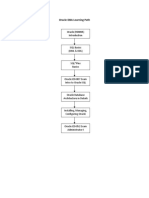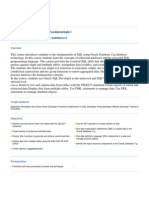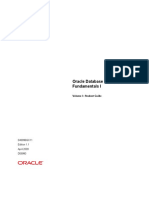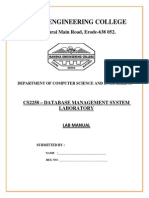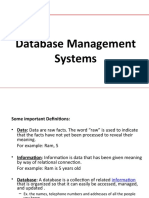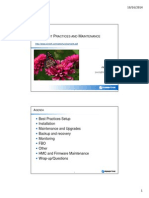Oracle Database 11g SQL Fundamentals 1
Uploaded by
Melvin Mieses AntiguaOracle Database 11g SQL Fundamentals 1
Uploaded by
Melvin Mieses Antiguahttp://education.oracle.com/pls/web_prod-plq-dad/ou_certificati...
Oracle Certification Program
Oracle Database 11g: SQL Fundamentals I
Exam available online
Printer View
Exam Number: 1Z0-051
Associated Oracle 11g DBA OCA Duration: 120 minutes
Certifications: Oracle 10g DBA OCA # of Questions: 70
Oracle9i DBA OCA
Passing Score: 60%
Oracle PL/SQL Developer Certified Associate
Passing score subject to change. View Details
Exam Price: € 90
Pricing may vary slightly by country or by localized currency.
Check Pearson VUE’s website for exact pricing in your
country.
Click Here to Register
Register:
Recommended Training and Preparation Additional Information & Resources Exam Topics Fraudulent Activity Policy
Recommended Training and Preparation
Oracle Database 11g: SQL Fundamentals I
OR
Oracle Database 11g: SQL Fundamentals l Ed 1 LWC
OR
Oracle Database 11g: Introduction to SQL
OR
Oracle Database 11g: Introduction to SQL Ed 1 LWC
Note: The Oracle Database 11g: Introduction to SQL course covers additional topics that are not covered on the exam.
Exam 051 has been validated against Oracle Database 10g and Oracle Database 11g. Training on either version will be appropriate preparation.
The exam has been validated against Oracle® Database 11g Release 2 version 11.2.0.1.0
Additional Information & Resources
Practice Exams
Oracle authorized practice exam from Self Test Software: 1Z0-051 Oracle Database 11g: SQL Fundamentals I
Oracle authorized practice exam from Transcender: Cert-1Z0-051 DBCert: Oracle Database 11g: SQL Fundamentals I
Exam Retake Policy
Sample Questions
Exam Topics
Retrieving Data Using the SQL SELECT Reporting Aggregated Data Using the Group Manipulating Data
Statement Functions [] Describe each data manipulation language
[] List the capabilities of SQL SELECT [] Identify the available group functions (DML) statement
statements [] Describe the use of group functions [] Insert rows into a table
[] Execute a basic SELECT statement [] Group data by using the GROUP BY clause [] Update rows in a table
Restricting and Sorting Data [] Include or exclude grouped rows by using the [] Delete rows from a table
[] Limit the rows that are retrieved by a query HAVING clause [] Control transactions
[] Sort the rows that are retrieved by a query Displaying Data from Multiple Tables Using DDL Statements to Create and Manage
[] Use ampersand substitution to restrict and sort [] Write SELECT statements to access data from Tables
output at runtime more than one table using equijoins and [] Categorize the main database objects
Using Single-Row Functions to Customize nonequijoins [] Review the table structure
Output [] Join a table to itself by using a self-join [] List the data types that are available for
[] Describe various types of functions available in [] View data that generally does not meet a join columns
SQL condition by using outer joins [] Create a simple table
[] Use character, number, and date functions in [] Generate a Cartesian product of all rows from [] Explain how constraints are created at the time
SELECT statements two or more tables of table creation
Using Conversion Functions and Conditional Using Subqueries to Solve Queries [] Describe how schema objects work
Expressions [] Define subqueries Creating Other Schema Objects
[] Describe various types of conversion functions [] Describe the types of problems that the [] Create simple and complex views
that are available in SQL subqueries can solve [] Retrieve data from views
[] Use the TO_CHAR, TO_NUMBER, and [] List the types of subqueries [] Create, maintain, and use sequences
TO_DATE conversion functions [] Write single-row and multiple-row subqueries [] Create and maintain indexes
[] Apply conditional expressions in a SELECT Using the Set Operators [] Create private and public synonyms
statement [] Describe set operators
[] Use a set operator to combine multiple queries
into a single query
[] Control the order of rows returned
BACK TO TOP
Oracle Certification Program Fraudulent Activity Policy
Oracle reserves the right to take action against any candidate involved in fraudulent activities, including, but not limited to, fraudulent use of vouchers, promotional codes,
1 de 2 16/03/2010 03:42 p.m.
http://education.oracle.com/pls/web_prod-plq-dad/ou_certificati...
a candidate's Oracle Certified Associate, Oracle Certified Professional and/or OCM credentials, temporary, indefinite or permanent ban of a candidate from Oracle
certification programs, notification to a candidate's employer, and notification to law enforcement agencies. Candidates found committing fraudulent activities forfeit all fees
previously paid to Oracle, or to Oracle's authorized vendors, and may be required to pay additional fees for services rendered.
2 de 2 16/03/2010 03:42 p.m.
You might also like
- Download Study Guide for 1Z0 071 Oracle Database 12c SQL Oracle Certification Prep 1st Edition Matthew Morris ebook All Chapters PDF100% (1)Download Study Guide for 1Z0 071 Oracle Database 12c SQL Oracle Certification Prep 1st Edition Matthew Morris ebook All Chapters PDF55 pages
- Matthew Morris - Study Guide For 1Z0-071 - Oracle Database 12c SQL - Oracle Certification Prep (2016, ODB Press)100% (12)Matthew Morris - Study Guide For 1Z0-071 - Oracle Database 12c SQL - Oracle Certification Prep (2016, ODB Press)211 pages
- Oracle Database 11g - SQL Fundamentals I Vol3100% (2)Oracle Database 11g - SQL Fundamentals I Vol362 pages
- Exam Available Online: Oracle Certification Program Oracle Database 11g: SQL Fundamentals INo ratings yetExam Available Online: Oracle Certification Program Oracle Database 11g: SQL Fundamentals I2 pages
- Oracle Certifications:: (Any One Exam Out of 3) - Click The Link To Get More Info. orNo ratings yetOracle Certifications:: (Any One Exam Out of 3) - Click The Link To Get More Info. or6 pages
- Oracle Database 11g: SQL Fundamentals I: Exam Number: 1Z0-051 Exam Price: US$ 125No ratings yetOracle Database 11g: SQL Fundamentals I: Exam Number: 1Z0-051 Exam Price: US$ 1254 pages
- Oracle Database 10g: Introduction To SQL: DurationNo ratings yetOracle Database 10g: Introduction To SQL: Duration5 pages
- Oracle Database: Introduction To SQL: DuraciónNo ratings yetOracle Database: Introduction To SQL: Duración5 pages
- Download full Study Guide for 1Z0 071 Oracle Database 12c SQL Oracle Certification Prep 1st Edition Matthew Morris ebook all chapters100% (2)Download full Study Guide for 1Z0 071 Oracle Database 12c SQL Oracle Certification Prep 1st Edition Matthew Morris ebook all chapters62 pages
- Oracle 11g SQL Training - Covers 11g Certification Syllabus: Course HighlightsNo ratings yetOracle 11g SQL Training - Covers 11g Certification Syllabus: Course Highlights7 pages
- Oracle Database 11g: SQL Fundamentals I: D49996GC10 Edition 1.0 August 2007 D52128No ratings yetOracle Database 11g: SQL Fundamentals I: D49996GC10 Edition 1.0 August 2007 D5212814 pages
- Oracle Database: Introduction To SQL Ed 2: DurationNo ratings yetOracle Database: Introduction To SQL Ed 2: Duration5 pages
- Exam Summary - Syllabus - Questions: Oracle Database SQLNo ratings yetExam Summary - Syllabus - Questions: Oracle Database SQL8 pages
- Oracle 11g SQL Training - As Per Industry Standards: Course HighlightsNo ratings yetOracle 11g SQL Training - As Per Industry Standards: Course Highlights6 pages
- Oracle Database 10g: Introduction To SQL: Duration 5 DaysNo ratings yetOracle Database 10g: Introduction To SQL: Duration 5 Days4 pages
- Use Only: Oracle Database 11g: SQL Fundamentals INo ratings yetUse Only: Oracle Database 11g: SQL Fundamentals I58 pages
- Oracle Database 11g: SQL Fundamentals I: D49996GC11 Edition 1.1 April 2009 D59980No ratings yetOracle Database 11g: SQL Fundamentals I: D49996GC11 Edition 1.1 April 2009 D5998016 pages
- Solution Manual for Oracle SQL By Example, 4/E 4th Edition Alice Rischertdownload100% (5)Solution Manual for Oracle SQL By Example, 4/E 4th Edition Alice Rischertdownload34 pages
- Total Number of Days 19: Duration: 5 Days Training + 2 Day Exam Prep + 1 Day Exam Exam Code: #1Z0-051No ratings yetTotal Number of Days 19: Duration: 5 Days Training + 2 Day Exam Prep + 1 Day Exam Exam Code: #1Z0-05110 pages
- Oracle SQL & PL/SQL Course Details: Why Besant Technologies?No ratings yetOracle SQL & PL/SQL Course Details: Why Besant Technologies?11 pages
- System Statements: Dbms Concepts Writing Basic SQL SELECT StatementsNo ratings yetSystem Statements: Dbms Concepts Writing Basic SQL SELECT Statements5 pages
- Silabus Oracle Database 11g: SQL Fundamentals I - LtmiNo ratings yetSilabus Oracle Database 11g: SQL Fundamentals I - Ltmi3 pages
- What Is Sql ?: Fundamentals of Sql,T-Sql,Pl/Sql and Datawarehousing.From EverandWhat Is Sql ?: Fundamentals of Sql,T-Sql,Pl/Sql and Datawarehousing.No ratings yet
- SQL Server Interview Questions You'll Most Likely Be AskedFrom EverandSQL Server Interview Questions You'll Most Likely Be AskedNo ratings yet
- Example of Thesis Using Qualitative Research100% (3)Example of Thesis Using Qualitative Research8 pages
- 2014-10 - VIOS Best Practices and Maintenance - Jaqui Lynch - ViosmaintNo ratings yet2014-10 - VIOS Best Practices and Maintenance - Jaqui Lynch - Viosmaint51 pages
- A Mixed Method Case Study of Student Engagement, Technology, Use and High School SUcessNo ratings yetA Mixed Method Case Study of Student Engagement, Technology, Use and High School SUcess10 pages
- Testing of Artificial Intelligence Sogeti Report 11-12-2017No ratings yetTesting of Artificial Intelligence Sogeti Report 11-12-201717 pages
- Data Migration Approach: Ramco Erp To Sap S/4 HanaNo ratings yetData Migration Approach: Ramco Erp To Sap S/4 Hana6 pages
- What Good Is A College Degree? Education and Leader Quality ReconsideredNo ratings yetWhat Good Is A College Degree? Education and Leader Quality Reconsidered16 pages
- Relocation and Redevelopment of Municipal HallNo ratings yetRelocation and Redevelopment of Municipal Hall6 pages
- Exam DP-203 - Data Engineering On Microsoft AzureNo ratings yetExam DP-203 - Data Engineering On Microsoft Azure26 pages
- Ans: Cursor Has Not Been Declared With Hold OptionNo ratings yetAns: Cursor Has Not Been Declared With Hold Option12 pages
- Multiple-Row Subquery: Dept. of Computer Science Faculty of Science and TechnologyNo ratings yetMultiple-Row Subquery: Dept. of Computer Science Faculty of Science and Technology13 pages
- Tracing The Trajectory of Vocational Education Research On Career Adaptability: A Bibliometric StudyNo ratings yetTracing The Trajectory of Vocational Education Research On Career Adaptability: A Bibliometric Study14 pages















